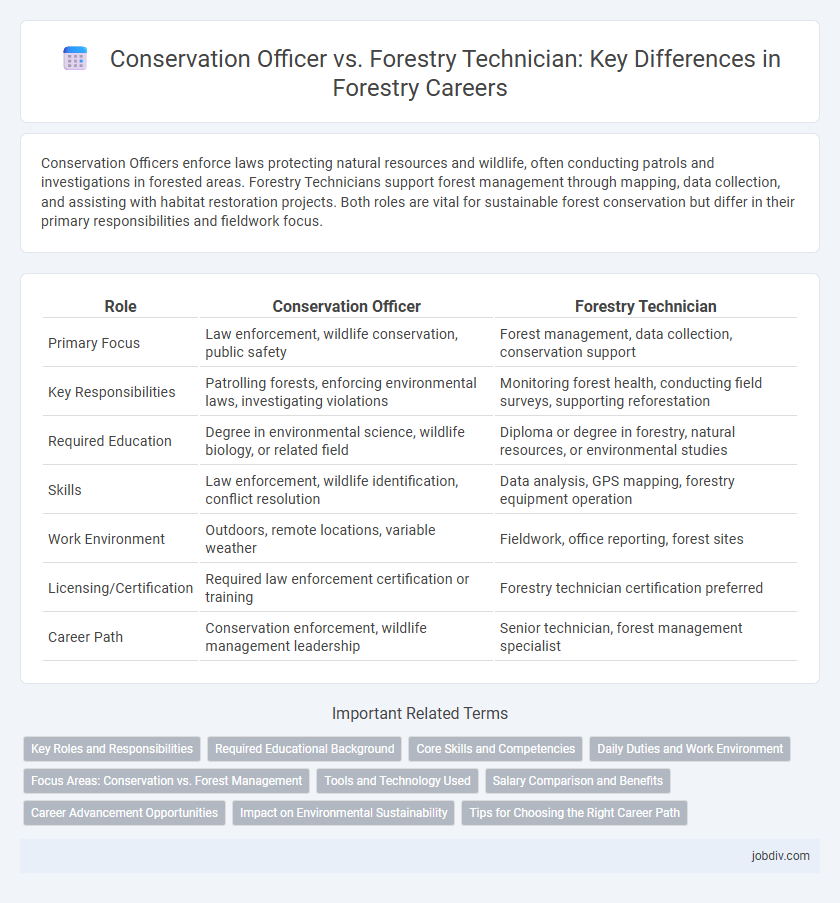Conservation Officers enforce laws protecting natural resources and wildlife, often conducting patrols and investigations in forested areas. Forestry Technicians support forest management through mapping, data collection, and assisting with habitat restoration projects. Both roles are vital for sustainable forest conservation but differ in their primary responsibilities and fieldwork focus.
Table of Comparison
| Role | Conservation Officer | Forestry Technician |
|---|---|---|
| Primary Focus | Law enforcement, wildlife conservation, public safety | Forest management, data collection, conservation support |
| Key Responsibilities | Patrolling forests, enforcing environmental laws, investigating violations | Monitoring forest health, conducting field surveys, supporting reforestation |
| Required Education | Degree in environmental science, wildlife biology, or related field | Diploma or degree in forestry, natural resources, or environmental studies |
| Skills | Law enforcement, wildlife identification, conflict resolution | Data analysis, GPS mapping, forestry equipment operation |
| Work Environment | Outdoors, remote locations, variable weather | Fieldwork, office reporting, forest sites |
| Licensing/Certification | Required law enforcement certification or training | Forestry technician certification preferred |
| Career Path | Conservation enforcement, wildlife management leadership | Senior technician, forest management specialist |
Key Roles and Responsibilities
Conservation Officers enforce environmental laws, monitor wildlife habitats, and ensure compliance with regulations to protect natural resources. Forestry Technicians support forest management by collecting data, assisting in reforestation efforts, and maintaining equipment for sustainable forest practices. Both roles contribute to ecosystem preservation but focus on law enforcement and field operations respectively.
Required Educational Background
Conservation Officers typically require a bachelor's degree in natural resource management, environmental science, or wildlife biology to manage and enforce conservation laws effectively. Forestry Technicians often need a two-year associate degree in forestry technology or a related field, focusing on practical skills like forest inventory and data collection. Both roles prioritize knowledge of ecological principles, but Conservation Officers require more extensive education to handle regulatory responsibilities.
Core Skills and Competencies
Conservation Officers possess expertise in wildlife management, law enforcement, and environmental regulations, ensuring habitats and species are protected through monitoring and public education. Forestry Technicians specialize in forest inventory, mapping, data collection, and implementing silvicultural treatments to maintain forest health and support sustainable resource management. Both roles require proficiency in fieldwork, data analysis, and knowledge of ecological principles, but Conservation Officers emphasize regulatory enforcement while Forestry Technicians focus on operational forest management tasks.
Daily Duties and Work Environment
Conservation Officers enforce wildlife laws, conduct patrols in natural habitats, and engage with the public to promote environmental stewardship, often working in outdoor, rugged terrains. Forestry Technicians focus on data collection, forest management plans, and timber assessment, typically operating within both field settings and office environments. The work environment for Conservation Officers is more enforcement and community interaction-based, while Forestry Technicians emphasize technical analysis and ecological monitoring.
Focus Areas: Conservation vs. Forest Management
Conservation Officers specialize in protecting wildlife habitats, enforcing environmental laws, and maintaining ecological balance through conservation strategies. Forestry Technicians focus on forest management practices, including timber harvesting, reforestation, and monitoring forest health to ensure sustainable resource use. The distinction lies in Conservation Officers prioritizing habitat preservation, while Forestry Technicians emphasize forest resource planning and operational support.
Tools and Technology Used
Conservation Officers primarily use GPS devices, drones, and digital mapping software to monitor wildlife habitats, enforce regulations, and conduct environmental assessments. Forestry Technicians rely on laser rangefinders, increment borers, and Geographic Information Systems (GIS) to measure tree growth, assess forest health, and plan sustainable timber harvesting. Both roles incorporate advanced remote sensing technologies and data analysis tools to enhance forest management and conservation efforts.
Salary Comparison and Benefits
Conservation Officers typically earn a higher salary than Forestry Technicians, with median annual incomes ranging from $50,000 to $70,000 compared to $40,000 to $55,000 for Forestry Technicians. Benefits for Conservation Officers often include comprehensive health insurance, retirement plans, and paid field training, reflecting their law enforcement responsibilities. Forestry Technicians receive benefits such as weather-related hazard pay and seasonal bonuses, emphasizing their hands-on work in forest management and maintenance.
Career Advancement Opportunities
Conservation Officers often have broader law enforcement authority and a pathway to supervisory roles within wildlife and natural resource agencies, leading to greater career advancement opportunities. Forestry Technicians typically progress through specialized technical expertise and certifications, advancing to roles in forest management, planning, or research support. Both careers offer unique growth prospects, with Conservation Officers leaning towards regulatory leadership and Forestry Technicians towards scientific and operational expertise.
Impact on Environmental Sustainability
Conservation Officers enforce laws to protect wildlife and natural habitats, directly preventing illegal activities that harm ecosystems and promote biodiversity conservation. Forestry Technicians support sustainable forest management by conducting surveys, monitoring forest health, and assisting in reforestation projects that maintain carbon sequestration and soil quality. Both roles are critical in advancing environmental sustainability through regulatory enforcement and practical resource management interventions.
Tips for Choosing the Right Career Path
Understanding the distinct roles of Conservation Officers and Forestry Technicians is crucial when choosing a career path in forestry. Conservation Officers primarily enforce environmental laws and protect natural resources, requiring strong law enforcement skills and public interaction, while Forestry Technicians focus on fieldwork, data collection, and supporting sustainable forest management, demanding technical expertise and attention to detail. Evaluate your interests in regulatory duties versus hands-on forest management, alongside education requirements and career growth opportunities, to make an informed decision.
Conservation Officer vs Forestry Technician Infographic

 jobdiv.com
jobdiv.com